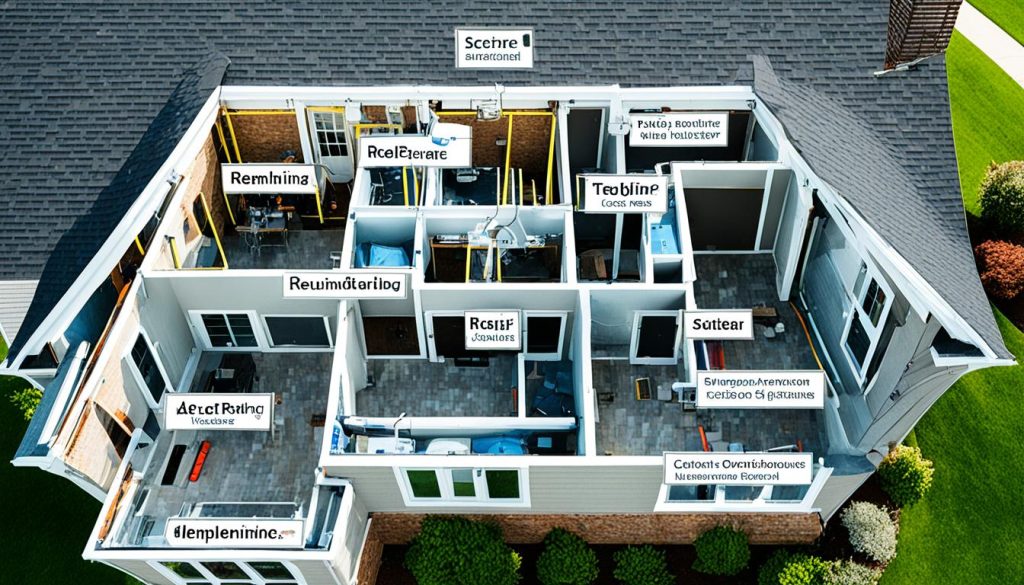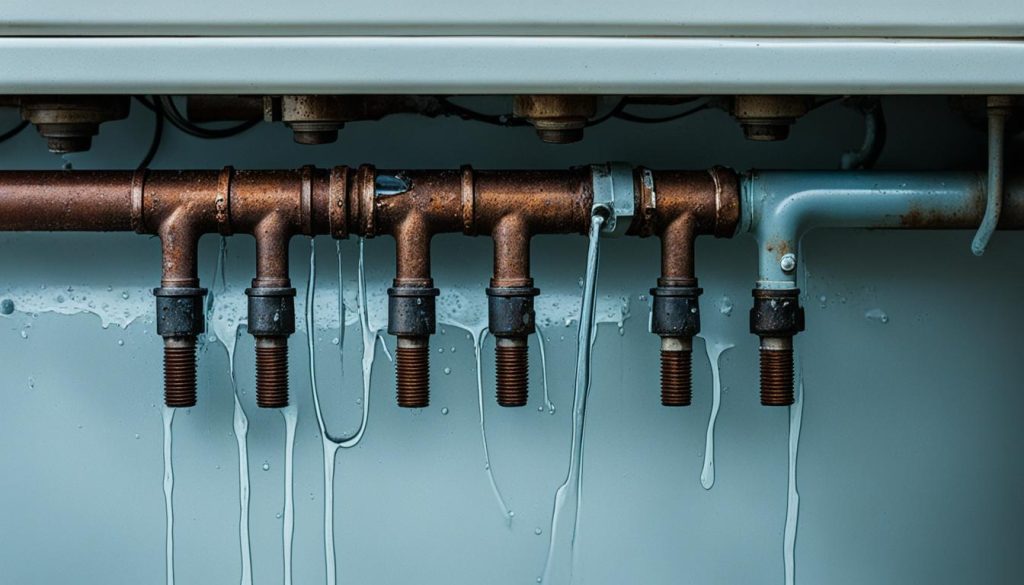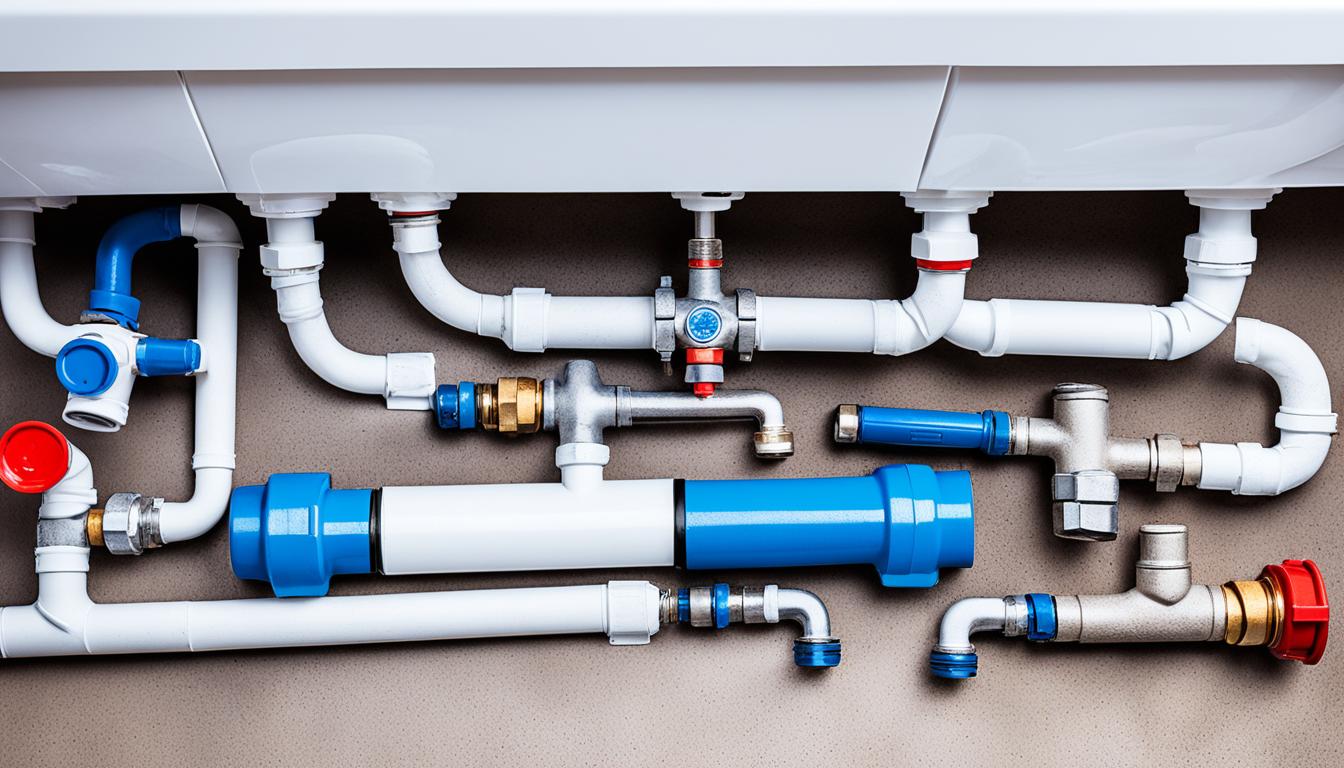Did you know that the cost to replumb a house can range from $3,000 to $16,000 for a typical 2,000-square-foot home? Replumbing your home is not only a significant investment, but it also plays a crucial role in maintaining your home’s value and preventing issues like water damage and contaminated water.
Key Takeaways:
- Replumbing your home can increase its value and prevent issues like water damage and contaminated water.
- The cost to replumb a house can range from $3,000 to $16,000 for a typical 2,000-square-foot home.
- Factors that influence the cost include the type of existing plumbing, the age of the house, the size of the home, the pipe material, labor costs, and the location of the pipes.
- It’s important to consider these factors and hire experienced professionals to ensure a successful replumbing project.
- By replumbing your home, you can ensure safe and reliable plumbing for you and future homeowners.
Why Replumbing Your Home is Important
Replumbing your home is vital for maintaining its value and ensuring the safety and wellbeing of your household. Faulty plumbing can lead to a decrease in the overall value of your house and deter potential buyers. By investing in a replumbing project, you can enhance your home’s appeal and pass buyer’s inspections with ease.
One of the key benefits of replumbing is the prevention of water damage. Leaky pipes can cause significant structural damage to your home over time, resulting in costly repairs. Replumbing helps you mitigate this risk by replacing old, corroded pipes and ensuring the integrity of your plumbing system.
Contaminated water poses a serious health hazard. If your home has old lead pipes, replumbing is essential to avoid the risk of consuming lead-contaminated water. Replacing these pipes with safer alternatives, such as copper or PEX, can help you provide clean and healthy water for your family.
By replumbing your home, you can have peace of mind knowing that your plumbing system is reliable and efficient. You’ll experience improved water flow, reduced water wastage, and enhanced overall performance. Moreover, replumbing can save you money in the long run by minimizing the need for frequent repairs and reducing water bills.
Benefits of Replumbing Your House:
- Prevent water damage and costly repairs
- Avoid contaminated water, especially if your home has lead pipes
- Enhance the value and marketability of your home
- Improve water flow and efficiency
- Reduce the risk of plumbing emergencies
- Save money on water bills and frequent repairs
Reasons to Replumb Your Home:
- Old, corroded pipes
- Leaky or burst pipes
- Inadequate water pressure
- Visible signs of rust or discoloration in water
- Presence of lead pipes
- Frequent plumbing issues
Investing in a professional replumbing service ensures that the job is done right the first time. Experienced plumbers have the knowledge, skills, and tools to replumb your home efficiently and effectively. They can also provide valuable advice on choosing the right pipe materials and optimizing your plumbing system for long-term reliability.
| Benefits of Replumbing | Reasons to Replumb |
|---|---|
| Prevent water damage | Old, corroded pipes |
| Avoid contaminated water | Leaky or burst pipes |
| Enhance home value | Inadequate water pressure |
| Improve water flow | Rust or discoloration in water |
| Reduce plumbing emergencies | Presence of lead pipes |
| Save money on repairs | Frequent plumbing issues |
Factors that Affect the Cost of Replumbing
Several factors come into play when determining the cost of replumbing a house. It’s important to consider these factors to get an accurate estimate and plan your budget accordingly.
Type of Existing Plumbing
The type of existing plumbing in your house can significantly impact the cost of replumbing. If your home has outdated or damaged pipes, such as lead pipes that need to be replaced, the cost can be higher. Replacing these pipes with modern, safer materials will ensure better water quality and longevity.
Age of the House
The age of your house is another crucial factor to consider. Older homes often have outdated plumbing systems that may require a complete overhaul. Corroded or deteriorating pipes can lead to leaks, water damage, and poor water pressure. Replumbing an older house may involve more extensive work and can affect the overall cost.
Size of the Home
The size of your home directly affects the amount of piping that needs to be installed or replaced. Larger homes typically require more materials, labor, and time to complete the replumbing project. As a result, the cost will be higher compared to smaller houses.
Pipe Material
The type of pipe material you choose for your replumbing project will impact the cost. Different materials, such as copper or PEX, have varying costs and advantages. Copper pipes are durable and have excellent corrosion resistance but can be more expensive. On the other hand, PEX pipes are more affordable and easier to install. Consider your budget and consult with a professional to determine the best pipe material for your specific needs.
Labor Costs
The cost of labor is a significant factor in the overall replumbing cost. Labor costs can vary depending on factors such as the complexity of the project, the number of plumbers required, and the duration of the work. Hiring experienced professionals ensures high-quality workmanship but may come at a higher price.
Location of Pipes
The location of your pipes within the house can also impact the cost of replumbing. If your pipes are easily accessible, the labor involved in installing or replacing them will be less intensive. However, if the pipes are hidden behind walls or in hard-to-reach areas, additional time and effort may be required, increasing the overall cost.
Understanding these factors and their impact on the cost of replumbing is essential for a successful project. By evaluating these variables, you can make informed decisions and work with plumbers to develop a replumbing plan that meets your needs and budget.
Estimating the Cost of Replumbing
Estimating the cost of replumbing a house involves taking various factors into consideration. The size and layout of your home, the number of plumbing fixtures, the type of pipe material, and the labor costs all contribute to the overall expense.
One important factor to consider is the square footage cost of replumbing. On average, homeowners can expect to pay around $4.50 per square foot for replumbing. However, it’s essential to note that this figure can vary depending on the specific factors mentioned earlier.
To get a rough estimate of the cost before embarking on a replumbing project, you can utilize a plumbing cost calculator. This handy tool allows you to input relevant details about your home’s size, plumbing fixtures, and other factors to obtain an estimate of the total cost.
By considering these factors and utilizing a plumbing cost calculator, you can have a better understanding of the financial investment required for your replumbing project.

Factors to Consider in Cost Estimation
- Size and layout of the house: Larger homes or homes with complex layouts may require more piping and labor, resulting in higher costs.
- Number of plumbing fixtures: The more fixtures you have in your home, such as sinks, toilets, and showers, the more materials and labor will be needed, impacting the overall cost.
- Type of pipe material: The choice of pipe material, such as copper or PEX, can affect both material and labor costs.
- Labor costs: Labor charges vary depending on the location and the complexity of the replumbing project.
Considering these factors will give you a more accurate cost estimation and help you plan your replumbing project accordingly.
Signs that Your House Needs Replumbing
If you want to ensure the proper functioning of your home’s plumbing system, it’s important to be aware of the signs that indicate the need for replumbing. Ignoring these signs can lead to more severe issues in the future and may result in costly repairs. Here are some common signs to watch out for:
Rusty Colored Water
One of the most obvious signs of plumbing issues is rusty colored water. If you notice a brownish tint to your water, it’s a strong indication that your pipes are corroded or deteriorating. Rusty water can affect the taste and quality of your water and may even pose health risks. It’s essential to address this issue promptly to avoid further damage to your home’s plumbing system.
Consistent Leaks
Having consistent leaks from pipes or fixtures is another telltale sign that replumbing might be necessary. While minor drips can sometimes be fixed with simple repairs, persistent leaks can indicate underlying problems with your plumbing system. If you find yourself constantly dealing with leaks, it’s crucial to have a professional plumber assess the situation and determine if replumbing is required.
Low Water Pressure
Experiencing low water pressure throughout your home can be frustrating and could be indicative of plumbing issues. It may indicate mineral build-up or clogs in your pipes, which can restrict the flow of water. If you’ve noticed a decrease in water pressure over time, it’s advisable to consult a plumber to identify the underlying cause and determine if replumbing is necessary.
Corrosion in Pipes
Corrosion is a common problem in older homes with outdated plumbing systems. If you notice signs of corrosion, such as discolored or flaky pipes, it’s a clear indication that your pipes are deteriorating. Corrosion weakens the structural integrity of the pipes, making them more prone to leaks and bursts. Replumbing your home can help prevent further corrosion and ensure the reliability of your plumbing system.
Calcium Build-up
Calcium build-up around faucets and drains is often a sign of hard water, which can also indicate plumbing issues. Hard water contains high levels of minerals that can accumulate in your pipes, leading to clogs and reduced water flow. If you consistently notice white or yellowish deposits around your fixtures, it’s worth considering replumbing to address this issue.
If you observe any of these signs in your home, it’s essential to contact a trusted plumber for a thorough assessment. A professional plumber can help determine the extent of the plumbing issues and provide expert advice on whether replumbing is necessary.

| Signs of Plumbing Issues | Possible Causes |
|---|---|
| Rusty colored water | Corroded or deteriorating pipes |
| Consistent leaks | Underlying problems with plumbing system |
| Low water pressure | Mineral build-up or pipe clogs |
| Corrosion in pipes | Weakened structural integrity of pipes |
| Calcium build-up | Hard water with high mineral content |
Types of Pipe Materials for Replumbing
When it comes to replumbing your house, choosing the right pipe material is crucial for a successful and durable plumbing system. There are several types of pipe materials commonly used in replumbing projects, each with its own advantages and disadvantages. Let’s take a closer look at three popular options: copper pipes, PEX pipes, and CPVC pipes.
Copper Pipes
Copper pipes have been a go-to choice for plumbing systems for many years due to their durability and resistance to corrosion. Copper pipes are known for their long lifespan and ability to withstand high-pressure water flow. They are also relatively easy to install and provide excellent heat resistance, making them suitable for both hot and cold water lines. However, one downside of copper pipes is their higher cost compared to other materials. Nevertheless, the longevity and reliability of copper pipes make them a worthwhile investment for many homeowners.
PEX Pipes
PEX pipes, or cross-linked polyethylene pipes, have gained popularity in recent years due to their flexibility and ease of installation. PEX pipes are highly resistant to freezing, making them an excellent choice for cold weather climates. They are also resistant to corrosion and do not require soldering, making installation quicker and more straightforward. While PEX pipes are relatively new in the market, they have been extensively tested for safety and durability. However, PEX pipes may not be suitable for outdoor use, as they are sensitive to direct sunlight and may degrade over time if exposed.
CPVC Pipes
CPVC pipes, or chlorinated polyvinyl chloride pipes, are often chosen for hot water lines in replumbing projects. CPVC pipes are cost-effective and provide excellent heat resistance. They are also resistant to chemicals and have a long lifespan. However, over time CPVC pipes may become brittle due to exposure to high temperatures, leading to potential cracks or leaks. Therefore, it’s important to consider the specific needs of your replumbing project before opting for CPVC pipes.
Each type of pipe material has its pros and cons, and it’s essential to weigh these factors when deciding on the best option for your replumbing project. Factors such as budget, location, climate, and specific plumbing needs should be taken into consideration. Consulting with a professional plumber can help you make an informed decision and ensure the long-term success of your replumbing project.
Hiring a Professional Plumber for Replumbing
When replumbing your home, it’s essential to choose a reputable and experienced plumbing company. Hiring a professional plumber ensures that the replumbing project is done correctly and meets the highest standards of quality and safety.
Here are a few tips for choosing a plumber for your replumbing needs:
- Research reputable plumbers: Start by researching reputable plumbers in your area. Look for companies with positive online reviews and a track record of successful replumbing projects. Positive word-of-mouth recommendations from friends, family, or neighbors can also be valuable.
- Check for experience and expertise: It’s important to choose a plumber who has experience in replumbing projects. Look for professionals who specialize in residential replumbing and have the necessary knowledge and skills to handle the complexity of the job.
- Verify licensing and credentials: Ensure that the plumber you hire is licensed and certified by the relevant authorities. This guarantees that they have met the necessary requirements and adhere to established industry standards and regulations.
- Compare quotes: Obtain quotes from different plumbers to compare their prices and services. This allows you to find a plumber who offers cost-effective plumbing services without compromising on quality. Be sure to communicate your specific replumbing needs and ask for a detailed breakdown of the costs involved.
- Ask for references: Request references from the plumber and contact previous clients to inquire about their experience with the company. This can give you valuable insights into the plumber’s professionalism, reliability, and the overall satisfaction of their past customers.
By following these steps and taking the time to carefully choose a reputable and experienced plumber, you can ensure a successful replumbing project and peace of mind knowing that your home’s plumbing is in capable hands.
Conclusion
Replumbing your home is not only a necessary investment but also a smart decision to ensure the safety, functionality, and value of your property. By undertaking a replumbing project, you can prevent potential water damage, improve the quality of your water supply, and even pass buyer’s inspections with ease.
Throughout the replumbing process, it is crucial to consider the various factors that can affect the cost, such as the type of existing plumbing, the size and age of your home, the pipe material, labor costs, and the location of the pipes. Estimating the cost of replumbing beforehand can help you plan your budget effectively.
Recognizing the signs that indicate the need for replumbing, such as rusty colored water, consistent leaks, low water pressure, corrosion in pipes, and calcium build-up, allows you to take proactive steps to address these issues promptly.
To ensure a successful replumbing project, it is highly recommended to hire a professional plumber who is experienced, licensed, and reputable. By choosing a knowledgeable plumber, you can benefit from their expertise, efficient service, and cost-effective solutions.
Overall, replumbing your house is an investment that offers numerous long-term benefits. It improves the safety and functionality of your plumbing system, enhances the value of your home, and provides peace of mind. So, prioritize the importance of professional replumbing services and consult with experts to guide you through the process effectively.
Source Links
- https://ibuyer.com/blog/how-much-does-it-cost-to-replumb-a-house/
- https://www.bobvila.com/articles/cost-to-repipe-a-house/
- https://mykukun.com/blog/repiping-a-house-cost/
